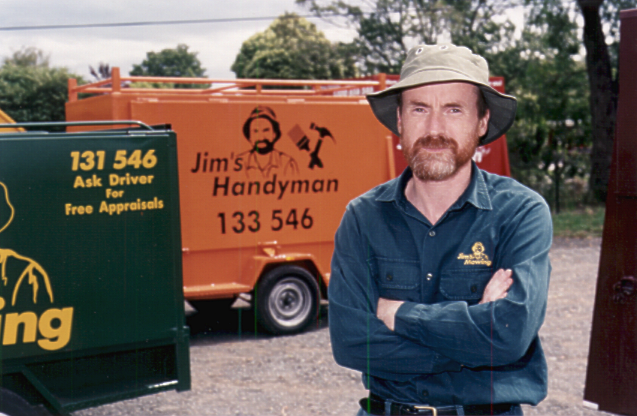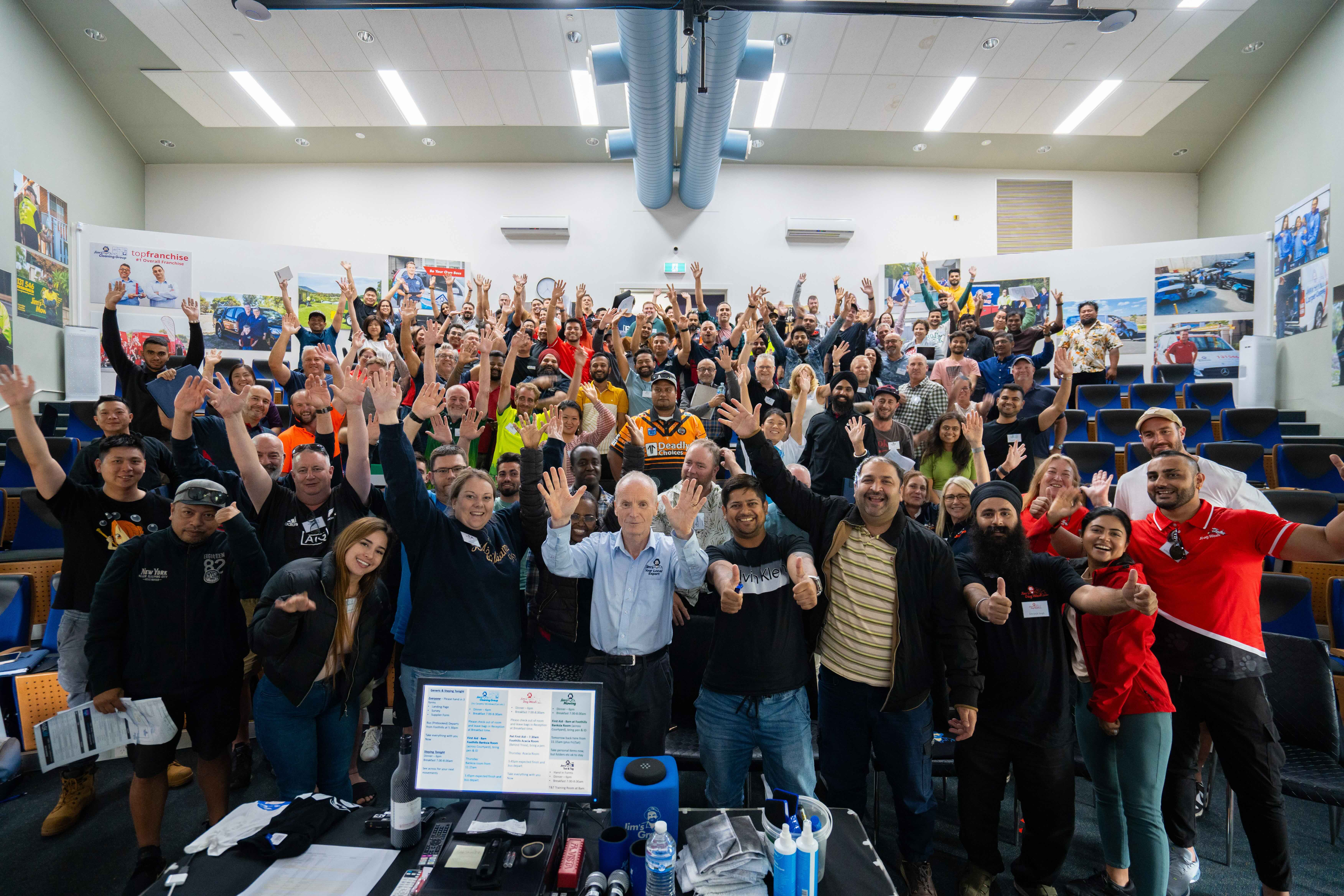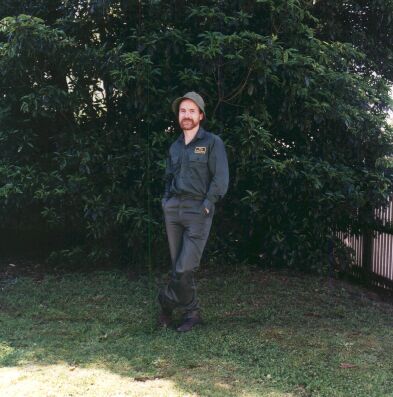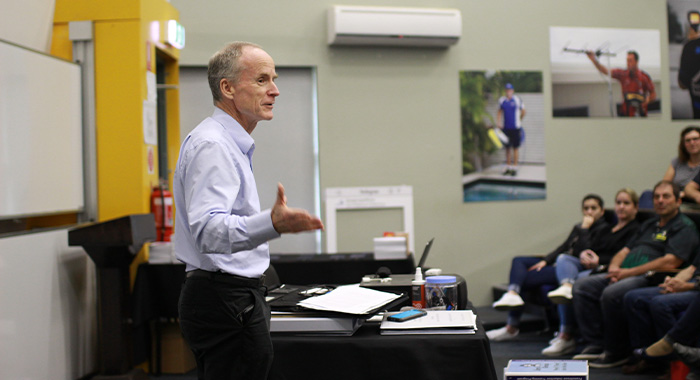An accidental success: How Jim Penman built a multimillion dollar franchise empire, Jim’s Group

With just $24 and a single lawnmower, Jim Penman grew his small side hustle into a multimillion dollar franchising behemoth, yet he insists he’s “not a natural business owner”. Here are the secrets to his success.
If there’s one thing that gets Jim Penman’s goat, it’s how badly franchisees can be treated in Australia, especially because many people looking to become franchisees are so vulnerable.
“We’re talking about people who may be fairly naive in business terms but are using their life savings or mortgaging their house to buy a franchise,” the 71-year-old founder of Jim’s Group, Australia’s largest home services franchise, told realcommercial.com.au.
“Often, they don’t have much experience. And they can be ripped off by franchisors who don’t have any regard to people who suffer so badly.”
A caveat: Mr Penman is on the lookout for new franchisees; his franchise empire recorded more than 200,000 unserviced leads last year.
“Our problem is not a lack of clients, it’s a lack of quality franchisees,” Mr Penman said.

Jim’s Group has more than 5,000 franchisees in Australia, New Zealand and Canada. Picture: Supplied
And he’s hoping that the closure of Godfrey’s may help boost his numbers.
At the end of March, the vacuum cleaner retailer’s administrators announced that after failing to find a buyer, the company will wind down its operations.
After more than 90 years in business, all 160 stores are set to close by the end of May, with 600 staff left without jobs .
Determined that the extensive knowledge, experience and customer service skills of Godfrey’s staff won’t go to waste, Mr Penman is keen to absorb as many people as he can into Jim’s Cleaning Group.
Welcoming them to Jim’s is a win-win for both parties, he says.
“Businesses closing is bad for the people employed, but sometimes it’s very good for us. We’re a strange company, we tend to do better during recessions in terms of growth than we do during the good times. And that’s mainly because of the availability of potential franchisees.
“So if you find a bunch of good ones, it’s not too much of a cost for us to give them a franchise. And when you’ve got good franchisees, it’s not difficult to get them work.”
An accidental success
Jim’s Group encompasses more than 50 divisions, from Jim’s Mowing, Jim’s Cleaning, Jim’s Dog Wash (some of its best known) to Jim’s Pool Care, Jim’s Mobile Mechanics, even Jim’s Life Coaching and Jim’s Beauty.
Despite Jim’s Group’s success, the company grew almost by accident, beginning with a primary school kid in 1960s Adelaide mowing his neighbours’ lawns.

Jim Penman started a part time gardening business while studying at university. Picture: Supplied
Mr Penman’s plan was always to be an academic and use his gardening business to finance his research, perhaps even a research institute.
“Most of my childhood, I had gardening jobs. When I left school in 1970, I took a gap year and started a small gardening business. I bought my first mower in about 1975 and carried on mowing part-time when I was doing a PhD.
“And then in 1982, my academic career having gone nowhere, I started it full-time. Then in 1998, I launched the franchise.”
But he never gave up on academia. In fact, Jim’s Group now funds the research institute he always dreamed of, which is looking into the positive effects of mild food restriction.

The business now has more than 50 franchise divisions, ranging from lawn mowing to bookkeeping and beauty. Picture: Supplied
Mr Penman says the success of Jim’s Group “surprises me greatly”.
“When I franchised, I thought if things go well I might end up with 100 franchisees. Now we have 5,300 franchisees across Australia and New Zealand, and 90 in Canada, and these numbers are slowly growing.
“I’m very fortunate that it’s gone so well. I’m not a natural business owner; there are so many things that I’m not very good at. But it’s just surprising what happens if you keep innovating.”
Asking the right questions
Despite franchisees being so in demand at Jim’s, Mr Penman claims the process of picking them is “highly selective”, involving a screening process, interviews and trial days on the road.
“I don’t take people unless we’re pretty convinced they’re going to succeed,” he said.
After being a franchisor for more than 25 years, he reckons he has a knack for sussing out a good one.
“It’s about presentation, how well they speak, if they communicate well, if they come across well. And if they sound responsible and ask good questions.”
But satisfaction in business should work both ways, of course.
Mr Penman says he’s always been more motivated by franchisee satisfaction than the actual number of franchisees.

Franchisee satisfaction is key in the success of the business, according to founder Jim Penman. Picture: Supplied
And creating happy staff means cultivating the right culture.
“What I’m most proud of is that we really go out of our way to help and support our franchisees, and they also look out for each other,” he said.
“During the COVID lockdowns in Victoria, they were all out of work with no income but they still gave each other food vouchers, called each other up and supported each other.
“In a sense, they’re my own values; I’ve always been passionate about my franchisee’s welfare. I give my personal phone number and email address to every franchisee at training and I’ll take calls anytime, even during the weekend or while I’m on holiday.”
But Mr Penman says this attitude of “franchisees first” makes Jim’s “a very unusual organisation”.
“There are some absolute rogues; I hear terrible stories about how franchisors treat their franchisees,” he said.
For those looking to purchase a franchise or become a franchisee, Mr Penman advises them to speak to previous and existing franchisees.
By law, a franchisor must provide the contact details for any former franchisee who has left the business over the previous three years, except for those who specifically requested their details remain private.
“Get hold of a list of franchisees and make phone calls to as many as possible. Ask them the questions: How well are you doing? How well are you looked after? Would you do it again?” he said.
“I’m always astonished that people can spend tens of thousands of dollars on their business without spending a couple of hours on fundamental research.
“Don’t listen to a sales pitch about buying the dream without actually doing the homework. And that applies to everywhere, including Jim’s.”







